The handheld Infrared oil analyzer from the FluidScan® 1000 series can directly and quantitatively measure the state of a lubricant. This is crucial to the predictive and proactive maintenance processes of Machine Condition Monitoring (MCM) in Reliability Management schemes.
Using the equipment, users can check when the oil needs servicing due to chemistry degradation, contamination from other fluids like water, or incorrect oil. The "Standard Test Method for Field Determination of In-Service Fluid Properties Using IR Spectroscopy," ASTM D7889, is compatible with the FluidScan.
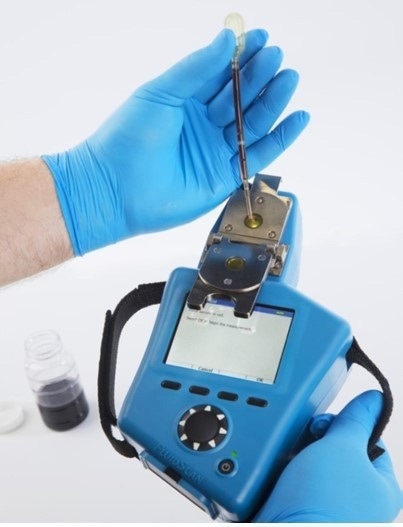
Image Credit: AMETEK Spectro Scientific
Dedicated Direct Infrared Spectrometer for Lubricant Condition Monitoring
- Designed with no moving parts for field-use applications.
- Compact for portability and hand-held use.
- Results that can be put into action for quick decisions.
- Hydraulic systems, gearboxes, and turbine lubricants require water, TAN, and oxidation.
- Water, TBN, glycol, soot, additive depletion, and engine oil oxidation, sulfation, and nitration.
- Additional uses include lubricant/biodiesel/fuel blending, transmissions, greases, and quality control.
Easy to Use
- It only takes a minute and one drop of oil to test
- Cleaning does not require solvents
- User-adjustable, color-coded alarm limitations that are simple to understand
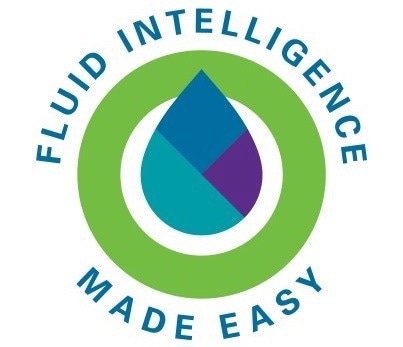
Image Credit: AMETEK Spectro Scientific
Determine When In-Service Oil is Not Fit for Use
- Lubricants used in gearboxes, turbines, and hydraulic systems can be measured directly and immediately, including water, TAN, and oxidation.
- TBN, water, glycol, soot, additive depletion, and engine oil oxidation are measured
Highly Repeatable and Reproducible Results
- “Standard Test Method for Field Determination of In-service Fluid Properties Using IR Spectroscopy” - ASTM D7889 Compliant.
- Excellent agreement with laboratory testing for TAN, TBN, and KF water.
- Repeatability and reproducibility are on par with the benchtop FTIR technique.
- Data analysis by ASTM E2412 and ASTM E1655.
- When combined with the Spectro MiniVisc 3050 Portable Viscometer, it meets the National Emission Standards for Hazardous Air Pollutants for Reciprocating Internal Combustion Engines (NESHAP RICE) requirements by extending oil change intervals for engines and backup generators.
Comprehensive Fluid Library and Application Categories
- More than 850 fluids are available for quick use.
- Various fluid libraries according to the application.
- The user in the field can customize fluid libraries.
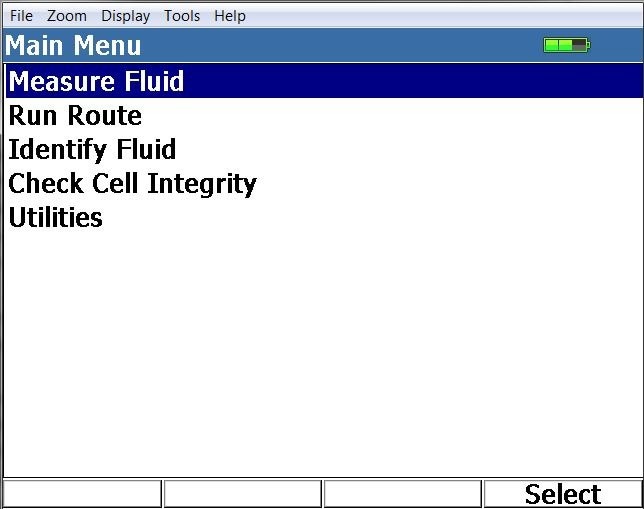
Image Credit: AMETEK Spectro Scientific
Measured Parameters
- The ability of the FluidScan to produce absolute quantitative data for important properties, such as TAN and water contaminations for industrial lubricants or TBN, water, glycol, and soot for engine oils, is one of its advantages over laboratory FTIR. Depending on the type of oil, the parameters offered by FluidScan are listed in the table below.
Source: AMETEK Spectro Scientific
| Application Categories |
Properties Measured by FluidScan |
| Transmission |
Water (PPM), Oxidation (Abs/0.1 mm), Fluid Integrity (unitless) |
| Hydraulic - Fire resistant (Phosphate Ester) |
Water (PPM), TAN (mg KOH/g) |
| Hydraulic - Aerospace (Synthetic Hydraulic Fluid) |
Water (PPM), Oxidation (Abs/0.1 mm), Alien Fluid mineral based (MIL-H-2304) (%), and Alien Fluid engine oil (ML-H-23699) (%) |
| Heat Transfer (Quenching Oil) |
Water (PPM), Oxidation (Abs/0.1 mm) |
| Industrial (Steam and CCGT Turbine, Hydraulic, Compressor, Chiller, Gear, etc.) |
Water (PPM), Oxidation (Abs/0.1 mm), TAN (mg KOH/g) |
| Turbine Aerospace (Synthetic Gas Turbine Oil) |
Water (PPM), TAN (mg KOH/g), Antioxidant (% depletion) |
| Engines (Engine oil for different engine types, including Gasoline, Diesel, Heavy Duty Diesel, HFO, Natural Gas, etc.) |
Water (PPM), Oxidation (Abs/0.1 mm), TBN (mg KOH/g), TAN (mg KOH/g) (Natural Gas only), Sulfation (Abs/0.1 mm), Nitration (Abs/cm), Soot (%), Glycol (%), Anti Wear (%)Biodiesel Dilution (%) (Diesel & Heavy Duty Diesel – Engine Oils) |
| Ethanol in Gasoline |
Ethanol (%) |
| FAME in Diesel |
FAME (%) |
| Biodiesel Feedstock |
Water (PPM), FFA (%) |
| Biodiesel |
Water (PPM), TAN (mg KOH/g), Total Glycerin (%) |
| Grease |
Water (abs/0.1 mm), Oxidation (abs/0.1 mm), Water Index (unitless) |
Fluid Manager Desktop Application Provides
- Reporting capabilities
- Syncing of devices
- Data redundancy
- Database Asset Manager
Applications Include:
- Oils, both synthetic and mineral, used in engines, gearboxes, and transmissions
- Turbines, hydraulic systems, and other machinery parts
- Biodiesel/Fuel New oil quality assurance
Innovative Water and Fluid Indentity Methods
- Complete water algorithm that is patented for both free and dissolved water
- A solvent-free Karl Fischer titration substitute
- Water index for tracking the state of the grease
- To identify fluid mix-ups, use fluid integrity
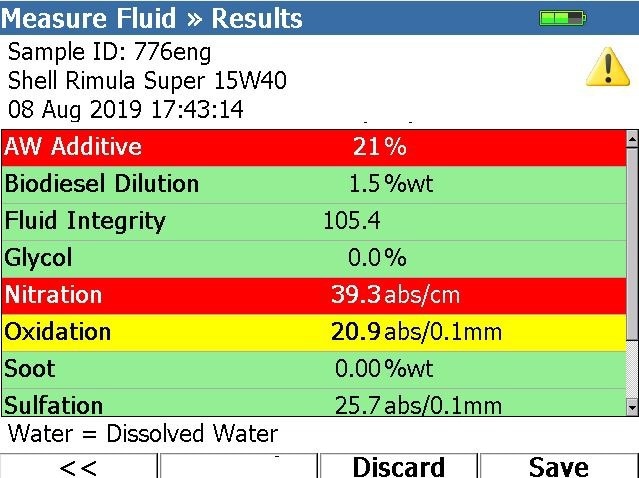
Image Credit: AMETEK Spectro Scientific
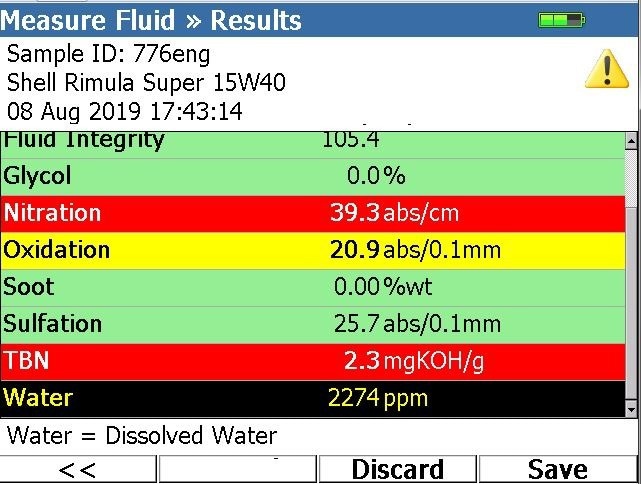
Image Credit: AMETEK Spectro Scientific
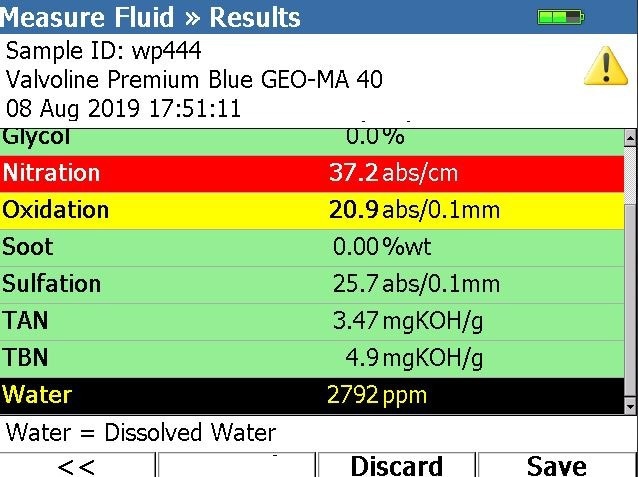
Image Credit: AMETEK Spectro Scientific
Operating Principle
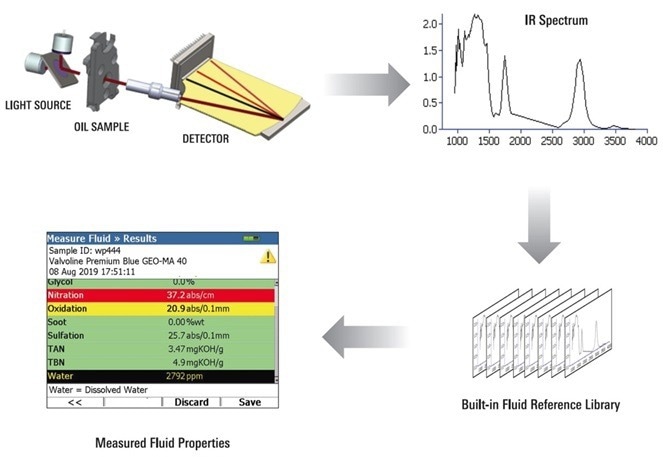
Image Credit: AMETEK Spectro Scientific
Innovation in Hardware
The FluidScan is based on a patented mid-infrared spectrometer. Its main component is a solid-state wave guide-equipped grating dispersive optical system, which lowers light leakage and boosts signal-to-noise ratio.
This design strategy removes any moving parts from the system that have intrinsic durability and does away with the requirement for periodic field calibration.
Methods Unique to FluidScan
- Industrial fluids with dissolved and free water can be measured using the patent-pending Total Water method.
- Fluid integrity parameter to track changes in oil condition and aid in mix-up detection
- Grease condition trends using the Water Index
Multivariate Calibration and Fluid Classification
For all types of oil, generic calibrations for parameters like TAN, TBN, and water do not yield reliable results. To get around this, the FluidScan uses advanced chemometric methods, such as those outlined in ASTM E1655.
- As stated in ASTM E2412, multivariate calibrations can consider interferences, such as the impact of water on the infrared signals associated with TAN in gas turbine lubricants.
- Based on their chemical makeup, the oils in the fluid library are also assigned by a classifier into various families that share an algorithm set. Users in the field can immediately match a new oil to the fluid library for dependable results by using this classification process.
Source: AMETEK Spectro Scientific
| FluidScan Parameter |
Method |
Correlates To |
| AW Additive |
Complies with ASTMD7889 |
ASTM D7412/E2412 (FTIR) |
| Oxidation |
Complies with ASTMD7889 |
ASTM D7414/E2412 (FTIR) |
| Sulfation |
Complies with ASTMD7889 |
ASTM D7415/E2412 (FTIR) |
| Nitration |
Complies with ASTMD7889 |
ASTM D7624/E2412 (FTIR) |
| Glycol |
Uses techniques described in ASTM E1655 |
ASTM E2412 (FTIR) |
| Soot |
Complies with ASTMD7889 |
ASTM D5967 (Thermo-Gravimetric Analysis) |
| TBN |
Uses techniques described in ASTM E1655 |
ASTM D4739 (Potentiometric Titration) |
| TAN |
Uses techniques described in ASTM E1655 |
ASTM D664 (Potentiometric Titration) |
| Water |
Uses techniques described in ASTM E1655 |
ASTM E2412 (FTIR)/ASTM D6304 (KarlFischer Titration) |
Product Models
Source: AMETEK Spectro Scientific
| PN |
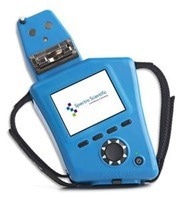
FluidScan 1000 |
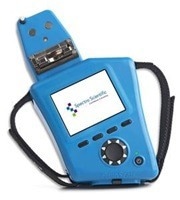
FluidScan 1100 |
| Default library |
One free library from FL364 to
FL371 at the time of purchase |
Industrial |
| Upgradable to full library |
Yes |
Yes |
| Total water license |
Optional |
Optional |
| Route base analysis |
No |
Yes |
| OilView Interface |
No |
Yes |
| TruVu 360 Device Console Interface |
No |
Yes |
| Intended application |
Portable Analysis |
On-Site Analysis |